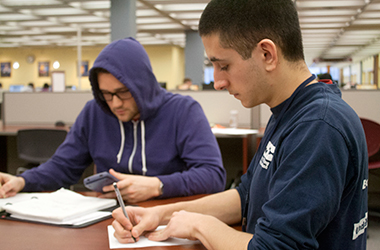Tutoring services reaches all-time high, benefits academics

Kent State tutor Adam Delduchetto (Right) works with Ethan Levitt (Left) on trigonometry in the library Tuesday, Feb. 18, 2014.
February 20, 2014
The number of students who use tutoring services at Kent State is at an all-time high.
During the fall semester, about 12,000 students visited an academic tutor, which is a substantial increase from past semesters, said Mike Donzella, academic programing coordinator for University Tutoring.
“Last semester was an all-time high,” Donzella said. “We had one week where 1,000 students came in for tutoring. We’re growing pretty significantly.”
Students said they used tutoring to improve their class grades and get a better understanding of the course material.
“I used Kent’s tutoring to my advantage,” sophomore business management major Logan Maholm said. “I just walked into the drop-in tutoring in the library.”
Maholm said he went to tutoring for help in his more-challenging classes, including accounting and calculus.
“They probably helped my test scores out a lot,” he said.
Donzella said math accounts for about 55 percent of all tutoring. Chemistry comes in second with 18 percent, followed by physics at 10 percent and biology at 5 percent.
Tutoring is available for almost every subject, but math and science classes are the “heavy hitters,” Donzella said.
With the increasing amount of students coming in to get tutored, the need for tutors themselves is becoming more important. This is a multiple-step process, which Donzella said can be lengthy.
“First, you have to receive an A or an A- in the classes you want to tutor,” he said. “Two, you have to have a 3.0 cumulative GPA. Three, you have to have a letter of recommendation from your professor, preferably someone who is in the class you want to tutor. Next, you have to go through the interview process. From there, there’s a subject essay you have to take.”
Senior physics major Tess Sage, who is a math, physics and computer science tutor, said both the long process and tutoring itself are demanding but rewarding at the end of the day.
“You have to be very flexible,” Sage said. “I do like tutoring, though, especially with the students who try really hard. When they say, ‘I would have never gotten an A if you [hadn’t] helped me,’ that means a lot. You also get refreshed with all of the information in your field of study, so it’s really helpful with all of your courses.”
Brittany Pellegrene, a senior chemistry major and chemistry, math and biology tutor, also said she enjoys tutoring.
“I like being able to help students learn things,” she said. “I also really like that it’s very flexible. It’s in between my classes, and my hours are the same every week, so I don’t have to worry about getting my work schedule and all of that kind of stuff mixed up.”
Students also benefit from the time spent with their tutor.

“I loved my math tutor,” sophomore fashion merchandising major Hannah Bioni said. “If it wasn’t for her, I wouldn’t have passed my math class last semester. We’re even close friends now.”
Another option for students looking for tutoring is supplemental instruction, or SI. SI is an academic-assistance service that provides peer-facilitated small group study sessions for students enrolled in large entry-level lecture courses. SI leaders are students who have taken the class in the past and have earned an A or A-.
SI sessions are designed for high-risk, historically difficult courses in which more than 30 percent of students in the courses receive a final course grade of D, F or W.
Kayla Scalf, a senior communication studies major who is an SI leader for microeconomics, said she wanted to be an SI leader because of a positive experience she had with the sessions.
“When I was a freshman, I attended SI, and it helped me grow as a student leader,” she said. “I wanted to be a part of it and help my peers with difficult material and become stronger studiers.”
According to a report published by the Academic Success Center, more than 9,000 students participated in SI sessions in the 2012-2013 school year, logging more than 25,000 hours in the sessions. On average, these students improved their course GPAs by nearly two-thirds of a letter grade.
Students who attended SI sessions also earned a D, F or W 18.25 percent less than students who did not attend the sessions.
For students interested in tutoring, there are a few ways to sign up, Donzella said.
“In the beginning of the semester, we send an email out to all of the classes that we have tutoring for to inform them that there’s free tutoring and informing them where to sign up at,” he said. “We also give them a link to our site if they would just want drop-in tutoring. The link provides times and also locations of tutoring.”
For information on how to find out times and locations of tutors, go to www.kent.edu/asc or go to the first floor of the library for a drop-in tutoring session.
Contact Drew Jones at [email protected].
























